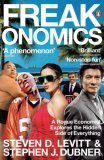Summary | Excerpt | Reading Guide | Reviews | Readalikes | Genres & Themes | Author Bio
A Rogue Economist Explores the Hidden Side of Everything

Critics' Opinion:
Readers' Opinion:
First Published:
Apr 2005, 256 pages
Paperback:
Apr 2006, 256 pages
These theories made their way, seemingly without question, from the
experts' mouths to the journalists' ears to the public's mind. In short
course, they became conventional wisdom.
There was only one problem: they weren't true.
There was another factor, meanwhile, that had greatly
contributed to the massive crime drop of the 1990s. It had taken shape more
than twenty years earlier and concerned a young woman in Dallas named Norma
McCorvey.
Like the proverbial butterfly that flaps its wings on one continent and
eventually causes a hurricane on another, Norma McCorvey dramatically
altered the course of events without intending to. All she had wanted was an
abortion. She was a poor, uneducated, unskilled, alcoholic, drug-using
twenty-one-year-old woman who had already given up two children for adoption
and now, in 1970, found herself pregnant again. But in Texas, as in all but
a few states at that time, abortion was illegal. As it happened, McCorvey's
cause was adopted by people far more powerful than she. They made her the
lead plaintiff in a class action lawsuit seeking to legalize abortion. The
defendant was Henry Wade, the Dallas County district attorney. The case
ultimately made it to the U.S. Supreme Court, by which time McCorvey's name
had been disguised as Jane Roe. On January 22, 1973, the court ruled in
favor of Ms. Roe, allowing legalized abortion throughout the country. By
this time, of course, it was far too late for Ms. McCorvey/Roe to have her
abortion. She had given birth and put the child up for adoption. (Years
later she would renounce her allegiance to legalized abortion and become a
pro life activist.)
So how did Roe v. Wade help trigger, a generation later, the
greatest crime drop in recorded history?
As far as crime is concerned, it turns out that not all children are born
equal. Not even close. Decades of studies have shown that a child born into
an adverse family environment is far more likely than other children to
become a criminal. And the millions of women most likely to have an abortion
in the wake of Roe v. Wade -- poor, unmarried, and teenage mothers
for whom illegal abortions had been too risky and too expensive -- were
often models of adversity. They were the very women whose children, if born,
would have been much more likely than average to become criminals. But
because of Roe v. Wade, these children weren't being born.
This powerful cause would have a drastic, distant effect: years later, just
as these unborn children would have entered their criminal primes, the rate
of crime began to plummet.
It wasn't gun control or a strong economy or new police strategies that
finally blunted the American crime wave. It was, among other factors, the
reality that the pool of potential criminals had dramatically shrunk.
Now, as the crime-drop experts (the former crime doomsayers) spun their
theories to the media, how many times did they cite legalized abortion as a
cause?
Zero.
It is the quintessential blend of commerce and camaraderie: you hire a
real-estate agent to sell your home.
She sizes up its charms, snaps some pictures, sets the price, writes a
seductive ad, shows the house aggressively, negotiates the offers, and sees
the deal through to its end. Sure, it's a lot of work, but she's getting a
nice cut. On the sale of a $300,000 house, a typical 6 percent agent fee
yields $18,000. Eighteen thousand dollars, you say to yourself: that's a lot
of money. But you also tell yourself that you never could have sold the
house for $300,000 on your own. The agent knew how to -- what's that phrase
she used? -- "maximize the house's value." She got you top dollar, right?
The foregoing is excerpted from Freakonomics by Steven D. Levitt and Stephen J. Dubner. All rights reserved. No part of this book may be used or reproduced without written permission from HarperCollins Publishers, 10 East 53rd Street, New York, NY 10022





The Funeral Cryer by Wenyan Lu
Debut novelist Wenyan Lu brings us this witty yet profound story about one woman's midlife reawakening in contemporary rural China.
Your guide toexceptional books
BookBrowse seeks out and recommends the best in contemporary fiction and nonfiction—books that not only engage and entertain but also deepen our understanding of ourselves and the world around us.